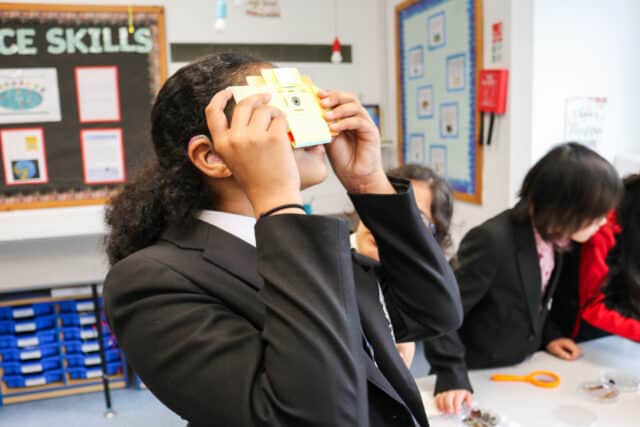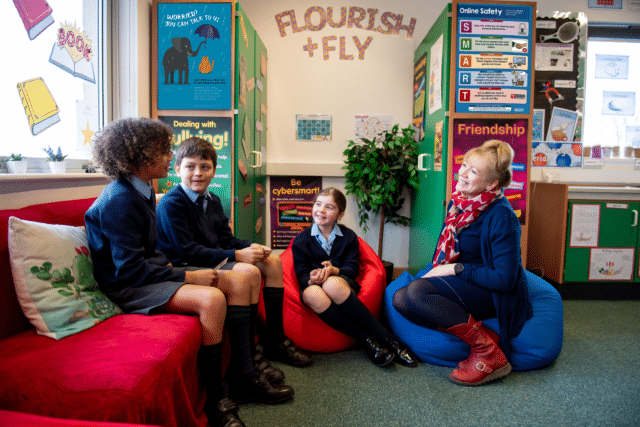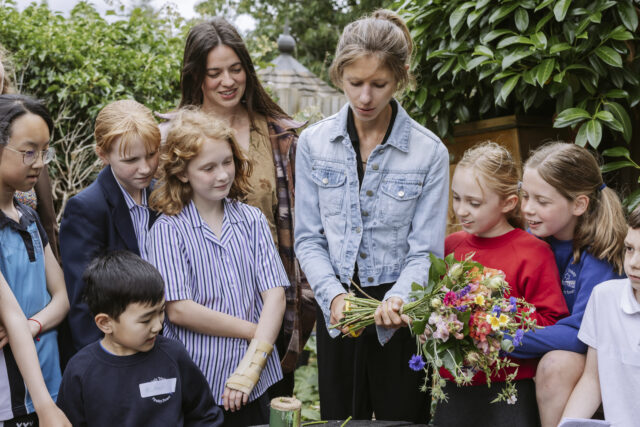Case Study
Changing the environment – A school in transition
 Cheadle Hulme School, in South Manchester, has set about Decarbonisation and Net Zero measures across a range of projects, turning ideas to action throughout 2021/22. ‘Living’ the key school values in a meaningful way, ‘Altruism, Resilience, Compassion and Contribution’, resonates within the School and local community, partner school’s, contractors and affiliated organisations.
Cheadle Hulme School, in South Manchester, has set about Decarbonisation and Net Zero measures across a range of projects, turning ideas to action throughout 2021/22. ‘Living’ the key school values in a meaningful way, ‘Altruism, Resilience, Compassion and Contribution’, resonates within the School and local community, partner school’s, contractors and affiliated organisations.
A holistic approach (taking a broad view of the environment and human sustainability) has the aim of improving the outcomes, understanding, engagement and ownership by an increasingly broad swathe of the community. It is a journey, but seen as an essential adjunct to education, life skills, social cohesion and, yes, business resilience.
 A Green Plan provided initial actions around sustainability and waste, combining staff and pupils in a joint environmental committee. Ideas are blended with the operations of the site. For example, the small estates/grounds team have combined preparation of revised spaces with supporting the teaching about gardening, the use of food, waste management and support to pupil projects.
A Green Plan provided initial actions around sustainability and waste, combining staff and pupils in a joint environmental committee. Ideas are blended with the operations of the site. For example, the small estates/grounds team have combined preparation of revised spaces with supporting the teaching about gardening, the use of food, waste management and support to pupil projects.
The Green Plan narrative was extended to parents and shared with a number of stakeholders and partners, alongside a communications increase and developing coherent imagery. Through its actions and ambitions, the School hopes to influence the behaviour and expectations of its entire community as future global citizens and leaders and help them make a positive impact on society.
Lovely words but what does this mean in practice?
- The Junior School, building on its Eco-School Green Flag status: developed a vegetable garden that provided food into the contract dining facility; introduced wormeries; learned about bees; planted wildflowers; helped plant 70 trees for the Queen’s Green Canopy (Platinum Jubilee), and influenced the construction of a forest school for their use. They also debated environmental action with other Junior Schools, hosted by Stockport Council’s Climate Action Now team.
- The Senior School, through an active 6th form eco-committee, ran an effective campaign to reduce waste and litter, delivered a ground-breaking sustainable fashion show and planted a small fruit orchard as a leaving gift to enable future use of home-grown products.
- A physical Green Path build was commenced to create an outdoor space for all, to aid wellbeing and health. The School won support and funding from the Council towards its development, with Junior School children crafting the path’s entrance, a living willow-arch tunnel.
- On a bigger scale, the school invested in a whole-site conversion of its entire lighting (indoors and out) to latest generation LED. Saving c.20% of electric utility consumption per annum, the immediate results are positive plus a much improved quality of light for teaching and safety around the site. This measure reduces carbon waste by 60 tonnes a year, equating to planting about 3000 trees; with a 20 year lifespan, it pays for itself within 4-5 years.
- Our electrical utility provider now uses 100% renewable electricity.
- A replacement programme to install efficient gas boilers, where necessary, reduces waste and improves compliance.
- Power monitoring equipment installation helps create a data baseline and provides evidence to make and understand change.
- A small living-wall was planted, improving space utilisation.
- A second-hand electric-only minivan was purchased for round-site deliveries.
- Bus utilisation increased and a ‘stop-idling’ (engines) campaign was run by the Junior School for event parking and pick-ups.
- Under a campaign ‘Reduce (waste), Remove (litter) and Recycle’ the following benefits emerged:
- The reduction of single use plastics (packaging).
- The removal of single use plastic water-bottles (installing improved water stations for ‘bring your own’ bottles).
- Using re-usable utensils for take-away staff dinners.
- The junior pupils conducted litter picking on-site as an example to older children and off-site as a community endeavour.
- Renewal of the waste contract to a 100% no-landfill provider.
- 90% of construction waste for a major build project was recycled.
- Over 500 IT and electronic devices were recycled.
- Our catering, cleaning, clothing and transport providers partnered on pathways to improving sustainability (and measurement).
- We re-energised a ‘Turn it off, turn it down, close it up’ mindset.
What’s next? ‘Persistence’!
 It is clear that this cannot be a one-shot wonder, or based around a few individuals’ experience or enthusiasm; behavioural, cultural and actionable change takes time, repetition, engagement, flexibility and continuity. We have to be the change we need to see.
It is clear that this cannot be a one-shot wonder, or based around a few individuals’ experience or enthusiasm; behavioural, cultural and actionable change takes time, repetition, engagement, flexibility and continuity. We have to be the change we need to see.
The School is moving towards a full Estate Decarbonisation Plan, deciding on a partner for measurement, data-analysis, accreditation and advice on next steps. We’re considering the potential to enable power generation to take the school ‘off-grid’, materially reducing its impact on society, providing example to others and controlling costs.
The School will start to host an annual ‘Eco Con’ with sustainability workshops and displays, supporting the journey of others. Recent solar panel surveys should lead to decisions on which buildings and what returns are worth immediate and medium-term investment.
Written by Warren James, Chief Operating Officer at Cheadle Hulme School
Related articles
-
Blogs
Taking Eco Action -
Case Studies
UCS Green Impact Society Leading The Way -
Case Studies
Sustainability at St Helen’s -
Case Studies
Protest has turned to action at Putney High School


